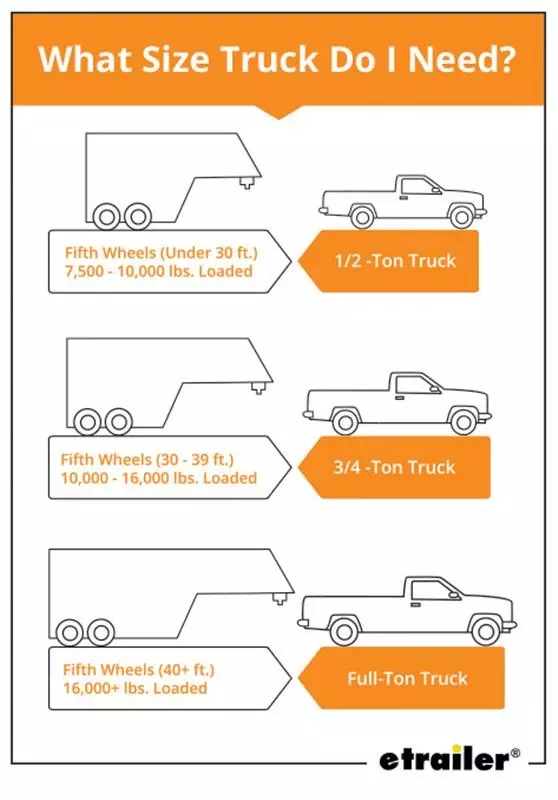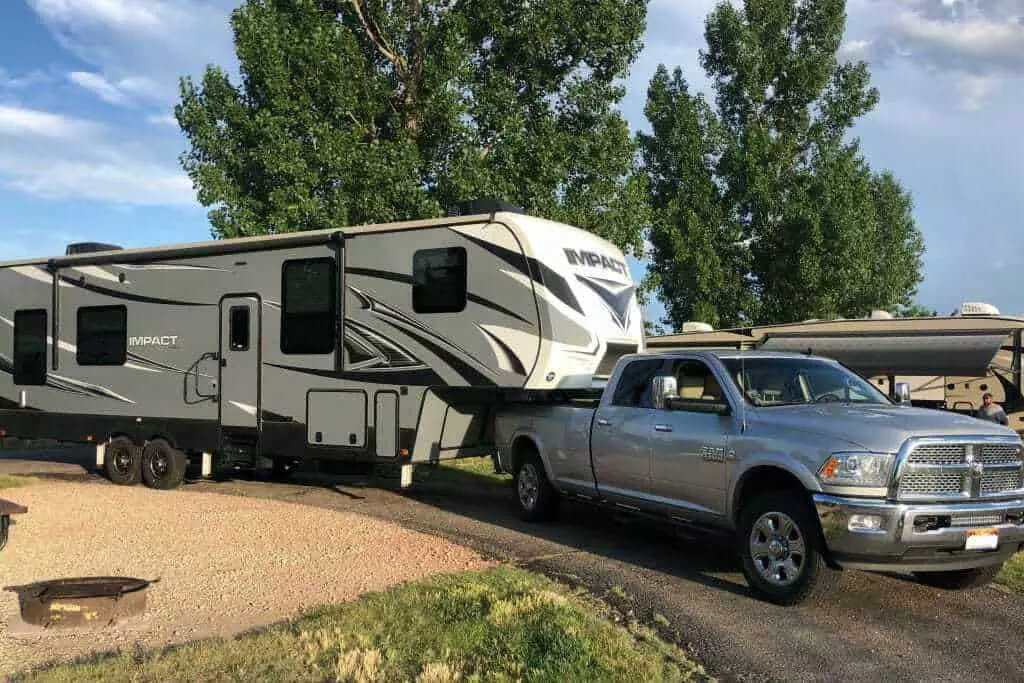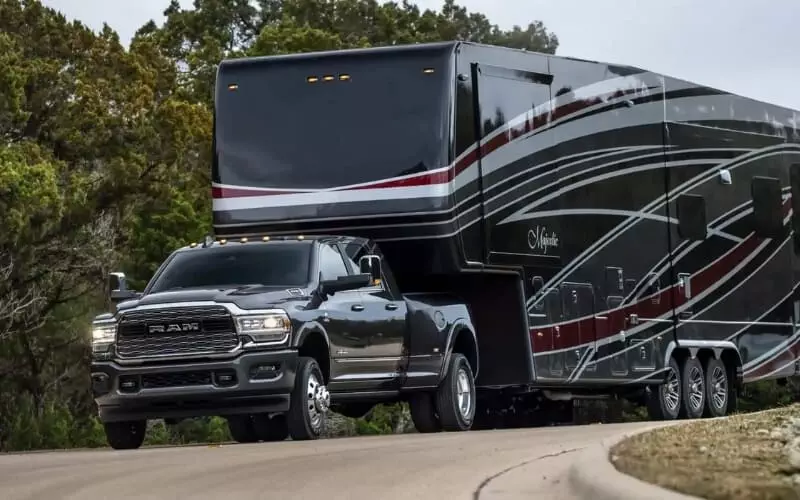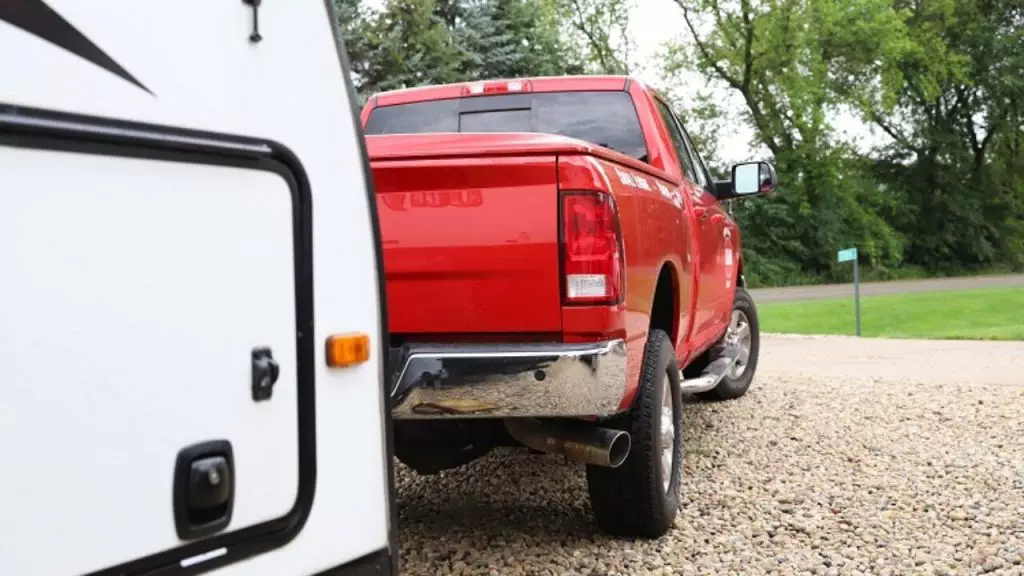In this article, we will discuss what size truck you will need to tow your trailer or camper. We understand that choosing the right size truck can be a daunting task, but don’t worry, we’re here to help! By the end of this article, you will have a better understanding of the factors to consider when determining the appropriate truck size for towing your belongings.
First and foremost, you’ll need to consider the weight of your trailer or camper. The weight of your towed vehicle is critical in determining the towing capacity of your truck. It is crucial to match the weight of your trailer with the towing capacity of your truck to ensure safe and efficient towing. Additionally, you should also take into account the size and length of your trailer as this can affect stability and maneuverability on the road. Our goal is to provide you with the information you need to make an informed decision and ensure a smooth towing experience. When it comes to towing, choosing the right truck is crucial for a safe and efficient towing experience. With a wide range of truck sizes available on the market, it can be overwhelming to determine which one is the best fit for your towing needs. In this article, we will discuss the factors to consider, how to calculate towing capacity, different truck size options, towing capacities of different trucks, additional towing equipment, choosing the right truck, safety considerations, legal requirements, and maintenance and upkeep. By the end of this article, you will have a better understanding of what size truck you need to tow.
Factors to Consider
Weight of the Load
One of the most important factors to consider when choosing a truck for towing is the weight of the load you will be towing. Before purchasing a truck, you need to have a clear idea of the maximum weight you will be towing. This includes not only the weight of the trailer but also any additional cargo or equipment you will be carrying.
Type of Trailer
The type of trailer you plan to tow is another crucial consideration. There are various types of trailers available, such as utility trailers, travel trailers, and fifth-wheel trailers. Each type of trailer has its own weight and compatibility requirements that need to be taken into account when choosing a truck.
Terrain and Conditions
The terrain and conditions in which you will be towing should also be considered. If you will be towing on rough or hilly terrain, you may need a truck with more power and stability. Additionally, if you will be towing in extreme weather conditions, such as snow or heavy rain, you may need a truck with features like four-wheel drive for enhanced control and traction.
Calculating Towing Capacity
Understanding the towing capacity of a truck is essential for choosing the right one for your towing needs. The towing capacity refers to the maximum weight a vehicle can safely tow. It is crucial to know this capacity to ensure you do not exceed the vehicle’s capabilities and put yourself and others at risk. There are several factors to consider when calculating towing capacity:
Understanding Gross Vehicle Weight Rating
The Gross Vehicle Weight Rating (GVWR) is the maximum weight a truck can carry, including its own weight and the weight of its passengers, cargo, and trailer tongue weight. It is important to stay within the GVWR to maintain safety and prevent damage to the vehicle.
Determining Tongue Weight
Tongue weight is the downward force exerted on the hitch ball by the trailer’s tongue or coupler. It is typically recommended to aim for a tongue weight that is 10-15% of the total trailer weight. To determine the tongue weight, you can use a tongue weight scale or consult the trailer manufacturer’s specifications.
Considering Trailer Weight and Payload
The weight of the trailer itself and any additional payload you plan to carry in the truck bed should also be taken into account when calculating towing capacity. This includes items such as luggage, tools, and other equipment that will be in the truck.

This image is property of www.etrailer.com.
Truck Size Options
Once you have determined the towing capacity you require, you can start looking at different truck size options. There are three main truck sizes to consider:
Compact Trucks
Compact trucks, also known as mid-size trucks, are smaller in size and offer a lower towing capacity compared to their larger counterparts. They are more fuel-efficient and easier to maneuver, making them a practical choice for towing smaller loads or for everyday commuting.
Mid-size Trucks
Mid-size trucks, as the name suggests, are a step up from compact trucks in terms of size and towing capacity. They offer a good balance between fuel efficiency and towing capability, making them suitable for towing medium-sized loads.
Full-size Trucks
Full-size trucks are the largest trucks available on the market and offer the highest towing capacities. They can handle heavy loads with ease and are often the go-to choice for towing large trailers and fifth-wheel campers. However, full-size trucks are less fuel-efficient and can be more challenging to maneuver in tight spaces.
Towing Capacities of Different Trucks
To give you a better idea of the towing capacities of different trucks, let’s take a look at each size category:
Compact Trucks Towing Capacities
Compact trucks typically have a towing capacity ranging from 3,000 to 7,000 pounds. Examples of compact trucks include the Toyota Tacoma and Chevrolet Colorado.
Mid-size Trucks Towing Capacities
Mid-size trucks generally have a towing capacity between 5,000 to 8,000 pounds. Popular mid-size truck models are the Ford Ranger and Nissan Frontier.
Full-size Trucks Towing Capacities
Full-size trucks have the highest towing capacities, typically ranging from 8,000 to 13,000 pounds or even more. Some notable full-size truck models are the Ford F-150, Chevrolet Silverado, and Ram 1500.
It is important to note that these towing capacities can vary depending on the specific engine, transmissions, and optional towing packages available for each truck model.

This image is property of www.your-rv-lifestyle.com.
Additional Towing Equipment
In addition to choosing the right truck, there are several towing equipment options you may need to consider:
Hitch Types
There are different types of hitches available, such as weight distribution hitches, gooseneck hitches, and fifth-wheel hitches. The type of hitch you need will depend on the type of trailer you will be towing and the towing capacity of your truck.
Brake Controllers
Brake controllers are essential for trailers equipped with electric brakes. They allow the driver to control the trailer brakes independently, improving safety and stability when towing.
Transmission Coolers
If you will be towing heavy loads or frequently towing in high temperatures, a transmission cooler can help prevent overheating and extend the life of your truck’s transmission.
Choosing the Right Truck
When choosing the right truck for towing, it is essential to match the towing capacity with your specific towing needs. However, there are other factors to consider as well:
Matching Towing Capacity
Ensure that the truck’s towing capacity matches or exceeds the weight of the load you plan to tow, including trailer weight and payload. It is always better to have some extra capacity to account for unexpected circumstances.
Considering Future Towing Needs
If you anticipate your towing needs to increase in the future, it may be wise to choose a truck with a higher towing capacity than your current requirements. This will allow you to accommodate larger trailers or heavier loads down the line.
Comfort and Features
While towing capacity is important, don’t overlook the comfort and features of the truck itself. Consider factors such as cabin space, technology features, and overall driving experience to ensure a comfortable and enjoyable towing experience.

This image is property of www.rvingknowhow.com.
Safety Considerations
Safety should always be a top priority when towing. Here are some key safety considerations:
Stability and Control
Choose a truck with features such as trailer sway control, electronic stability control, and anti-lock brakes to ensure stability and control while towing. These features can help prevent accidents and make towing safer.
Proper Weight Distribution
Proper weight distribution is crucial to maintain stability and control while towing. Ensure that the load is distributed evenly between the trailer and truck, and make use of weight distribution hitches if necessary.
Understanding Trailer Sway
Trailer sway can occur when the trailer starts to oscillate from side to side, leading to instability. Understanding the causes and how to prevent or control trailer sway is essential for a safe towing experience.
Legal Requirements
When towing, there are certain legal requirements that must be met. These may vary depending on your location, but some common requirements include:
Licensing and Registration
Ensure that your truck and trailer are properly licensed and registered for towing. Some jurisdictions may require additional permits or endorsements for towing certain types of trailers.
Insurance Coverage
Check with your insurance provider to ensure that your policy covers towing activities. It is important to have adequate insurance coverage in case of accidents or damages while towing.
Traffic Laws
Familiarize yourself with the traffic laws and regulations regarding towing in your area. This includes speed limits, lane restrictions, and proper signaling when changing lanes or turning.

This image is property of www.goldeagle.com.
Maintenance and Upkeep
Proper maintenance and upkeep of your truck and towing equipment are crucial for safe towing. Here are some important maintenance tasks:
Regular Maintenance
Follow the manufacturer’s recommended maintenance schedule for your truck, including oil changes, tire rotations, and inspections. Regular maintenance can help prevent breakdowns and ensure optimal performance while towing.
Checking Trailer Hitch
Regularly inspect and lubricate the trailer hitch to ensure it is in proper working condition. It is important to check for any signs of wear or damage that may affect its performance.
Inspecting Towing Equipment
Inspect the towing equipment, such as safety chains, trailer brakes, and electrical connections, before each towing trip. Make sure they are secure and functioning properly to avoid any accidents or failures.
Conclusion
Choosing the right truck for towing is a decision that should not be taken lightly. Consider factors such as the weight of the load, type of trailer, terrain and conditions, and calculate the towing capacity accordingly. Take into account the different truck size options and their towing capacities, as well as additional towing equipment that may be necessary. Consider safety considerations, legal requirements, and maintenance and upkeep to ensure a safe and enjoyable towing experience. By carefully considering all these factors, you can confidently determine the size of truck you need to tow. Happy towing!

This image is property of i.ytimg.com.